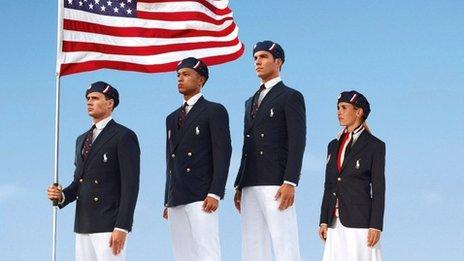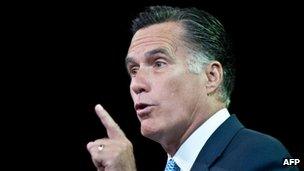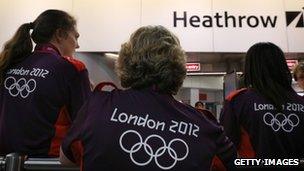China accuses the US of Olympic hypocrisy
- Published
- comments

The Team USA opening ceremony parade uniform by Ralph Lauren has caused controversy
The London games have yet to begin, not a single starting gun has been fired, and already the US and China are slugging it out.
The issue that's got everyone fired up is not who is likely to be top of the medals table or who is the true sporting superpower.
But it is, in a way, about US fears that China is cheating, not on the sporting field but in the economic one, about fears America is losing out to a rival who does not play fair.
It's a row over the blazers and berets, slacks and scarves the US team will wear at the opening ceremony. You can see them here, external, and a slideshow here, external. Designed and paid for by the clothing firm Ralph Lauren, they are made in China.
Congressional outrage
At a time when unemployment in America is 8%, members of Congress said they were outraged that the jackets were not stitched in America.
"I think they should take all the outfits, put them in a big pile and burn them and start over," said the Senate majority leader, Harry Reid, last week.
China's official Xinhua news agency has hit back. "Some US politicians have displayed shades of hypocrisy" said the official Xinhua news agency, in a commentary, external (which is not the same thing as an official government statement).
"The Olympic spirit, which has nothing to do with politics, chants mutual understanding and fair play, so tagging the uniforms with politics by those US politicians exposes narrow nationalism and ignorance, and violates the original Olympic Spirit" said Xinhua.
But fair play is exactly what many in America worry about. They fear that China, through an undervalued currency, trade barriers and state subsidies to its exporters - in the form of cheap land, cheap loans, export rebates and other help - is hollowing out US industry and jobs.
'Gut punch'
Ralph Lauren was accused of delivering "a gut-punch to most Americans" by Stu Bykofsky, a commentator for the Philadelphia Daily News, external, who wrote: "How could he not get it - that manufacturing Team USA in a country that half owns us and has wrecked the domestic garment industry would be like choking on a chicken bone? There's something like 600,000 American textile workers looking for jobs."

Mr Romney has called President Obama the "outsourcer-in-chief"
The clothing company now says, external Team USA uniforms for the next Olympics, the winter games in 2014, will be made in America.
Xinhua put all this down to US sensitivities in what is an election year, saying it is "just another example of the fierce, and sometimes ridiculous, political fighting going on the Capitol Hill in the year of election, which is dominated by economic growth and job creation."
In the past week, President Obama's campaign has attacked Mitt Romney, claiming his firm Bain Capital was responsible for "outsourcing" jobs to China a decade ago.
Romney has fired back, calling President Obama the "outsourcer-in-chief", alleging that US government stimulus money helped create jobs in China rather than America.
Democrat senators now want to introduce legislation to ensure uniforms worn by US teams are produced in the United States.
Economic worries
But the row over jobs and trade has the potential to get much more serious. Romney has, in past months, said he will get tough on China over its trade and currency practices, threatening to declare it a currency manipulator as soon as he enters office.
The Obama administration has begun half a dozen trade complaints against China at the WTO, over rare earth minerals, and solar and wind power subsidies.

The US and China are in a row even before the Olympic games begin
Beneath all the rhetoric lie fears in the US that America is in decline, and China is rising but not playing fair.
In The Beijing Times on Monday, external Jia Xudong, a researcher at a think tank linked to China's Foreign Ministry, said "due to ideological mischief-making, some Americans intentionally or unintentionally see China as the enemy... Wearing ideological blinkers they look at China, seeing China as a competitive rival, and practising trade protectionism."
But in China, too, there are economic worries. China's economy has been slowing for the past year-and-a-half. Figures last week showed growth at its lowest level since the financial crisis.
At the weekend, Premier Wen Jiabao warned, external "hardship" may continue.
Right now, China does not need more disputes with the US, but things could get worse. Both countries, concerned about their economies and where growth will come from, will continue to compete for every job and every dollar of trade just as seriously as their athletes fight it out at the Olympics, and that means more trade disputes and more political tensions.